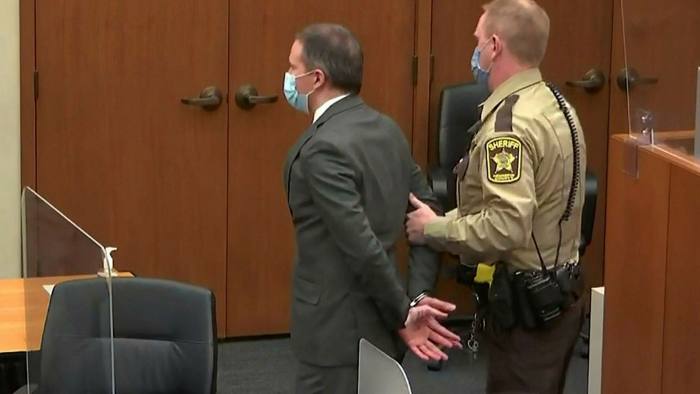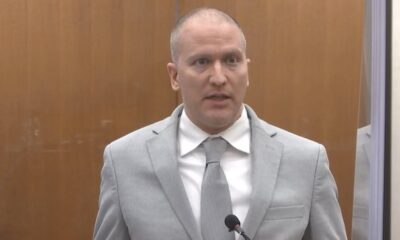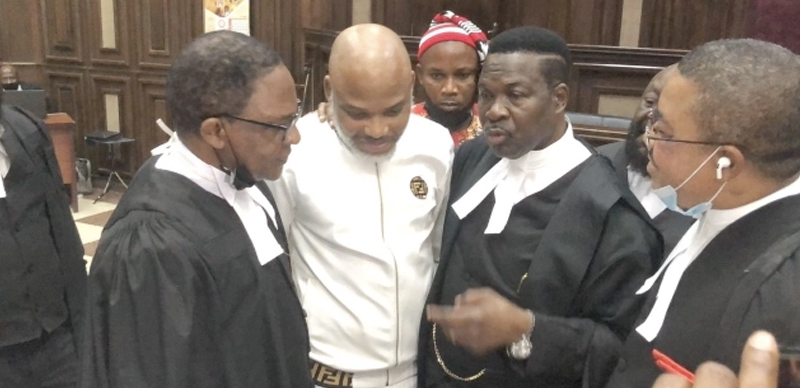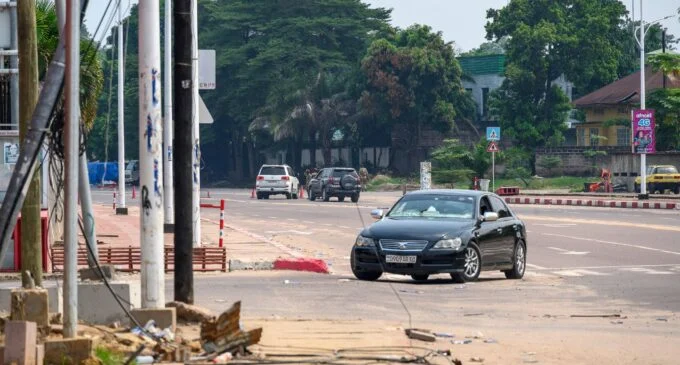The jurors in the murder trial of Derek Chauvin, former Minneapolis police officer on Tuesday found him guilty of all the three counts of killing African-American, George Floyd.
The verdict was announced by the presiding judge at the Hennepin County Court in Minneapolis, to wild cheers by hundreds of people awaiting the outcome.
The jurors began deliberation on Monday and on Tuesday afternoon, the website of the court said in a notice: ‘A verdict has been reached and will be read between 3:30-4:00 p.m. Tuesday, April 20.’
The jury had three issues to decide: Whether Chauvin was guilty of second degree murder, third degree murder and second degree manslaughter.
As a convicted murderer, Chauvin now faces a maximum of 75 years in prison, when sentenced in eight weeks.
He faces 40 years in prison for the first count of second degree murder.
He faces a maximum of 25 years for third degree murder and a 10-year maximum for the third degree manslaughter count against him.
After the verdict was handed down on Tuesday, Chauvin was remanded into custody.
In the closing argument on Monday, the prosecutors told jurors to “believe your eyes” as they replayed video of George Floyd’s death last May beneath the knee of Derek Chauvin in closing arguments on Monday in the former police officer’s murder trial.
Chauvin’s lead lawyer, Eric Nelson, countered that Chauvin behaved as any “reasonable police officer” would, arguing that he followed his training from 19 years on the force.
Over and over again, Steve Schleicher, a prosecutor with the Minnesota attorney general’s office, repeated a phrase: “Nine minutes and 29 seconds,” — the length of time Chauvin was captured on video on May 25, 2020, with his knee pressed into the dying Floyd’s neck.
Although the jury’s verdict will be seen as a reckoning in the way the United States polices Black people, Schleicher emphasized in remarks that lasted nearly two hours that the jury was weighing the guilt of only one man, not a system.
“This wasn’t policing; this was murder,” Schleicher told jurors. He cited the motto of the Minneapolis Police Department, which fired Chauvin and three other officers after Floyd’s arrest: “To protect with courage and to serve with compassion.”
“Facing George Floyd that day that did not require one ounce of courage, and none was shown on that day,” Schleicher said, often speaking with audible anger and disgust. “All that was required was a little compassion and none was shown on that day.”
Chauvin, who is white, pushed his knee into the neck of Floyd, a 46-year-old handcuffed Black man, for more than nine minutes outside the grocery store where he had been suspected of buying cigarettes with a fake $20 bill.
“He was trapped with the unyielding pavement beneath him, as unyielding as the men who held him down,” Schleicher said, before playing some of the extensive video of Floyd’s death, which he said showed Chauvin mocking Floyd’s struggle to breath.
Chauvin has pleaded not guilty to second-degree unintentional murder, third-degree “depraved mind” murder and second-degree manslaughter.
Nelson, his lawyer, said prosecutors were wrong to dismiss his theory that carbon monoxide poisoning from the nearby police car’s exhaust and Floyd’s use of fentanyl, an opioid painkiller, may have contributed to Floyd’s death.
He repeated a single phrase scores of times, saying Chauvin behaved as a “reasonable police officer” would in dealing with a man as “large” as Floyd, who was struggling against being put in a police car when Chauvin arrived, responding to a call for back-up.
Chauvin, dressed in a grey suit and dark blue shirt and tie, removed his face mask, worn as part of the coronavirus pandemic’s social-distancing requirements, and watched the jurors listen to his lawyer, who spoke for nearly three hours.
In a final rebuttal before deliberations began, Jerry Blackwell, another prosecutor, scoffed at the carbon monoxide theory.
“What ‘reasonable police officer,’ when apprehending someone on the ground, subdues them and puts their face in front of a tailpipe of a car, and then thinks that’s a defense?” he asked.
The extensive video footage of Floyd’s death from multiple angles is the heart of the prosecution’s case. Jurors have spent hours rewatching the videos in the courtroom.
“You can believe your eyes,” Blackwell said. “It was what you saw. It was homicide.”
He said it shows Chauvin using unreasonable, and therefore illegal, force in compressing Floyd’s torso against the road, starving him of oxygen.
He said it was something that was obvious even to the youngest bystander, who testified in the first week. “Even a 9-year-old little girl knows it: get off of him,” Blackwell said.
But Nelson used the same videos to try to prove the opposite point: The fact that Chauvin continued kneeling on Floyd even as he knew he was being filmed was evidence he believed he was responding to the scene in a reasonable way, Nelson said.
“In this case, the totality of the circumstances that were known to a reasonable police officer in the precise moment the force was used demonstrates that this was an authorized use of force, as unattractive as it may be,” Nelson said.

 News3 years ago
News3 years ago
 Entertainment2 years ago
Entertainment2 years ago
 News3 years ago
News3 years ago
 Privacy3 years ago
Privacy3 years ago
 Sports2 years ago
Sports2 years ago
 Entertainment2 years ago
Entertainment2 years ago
 Opinion3 years ago
Opinion3 years ago
 News3 years ago
News3 years ago





